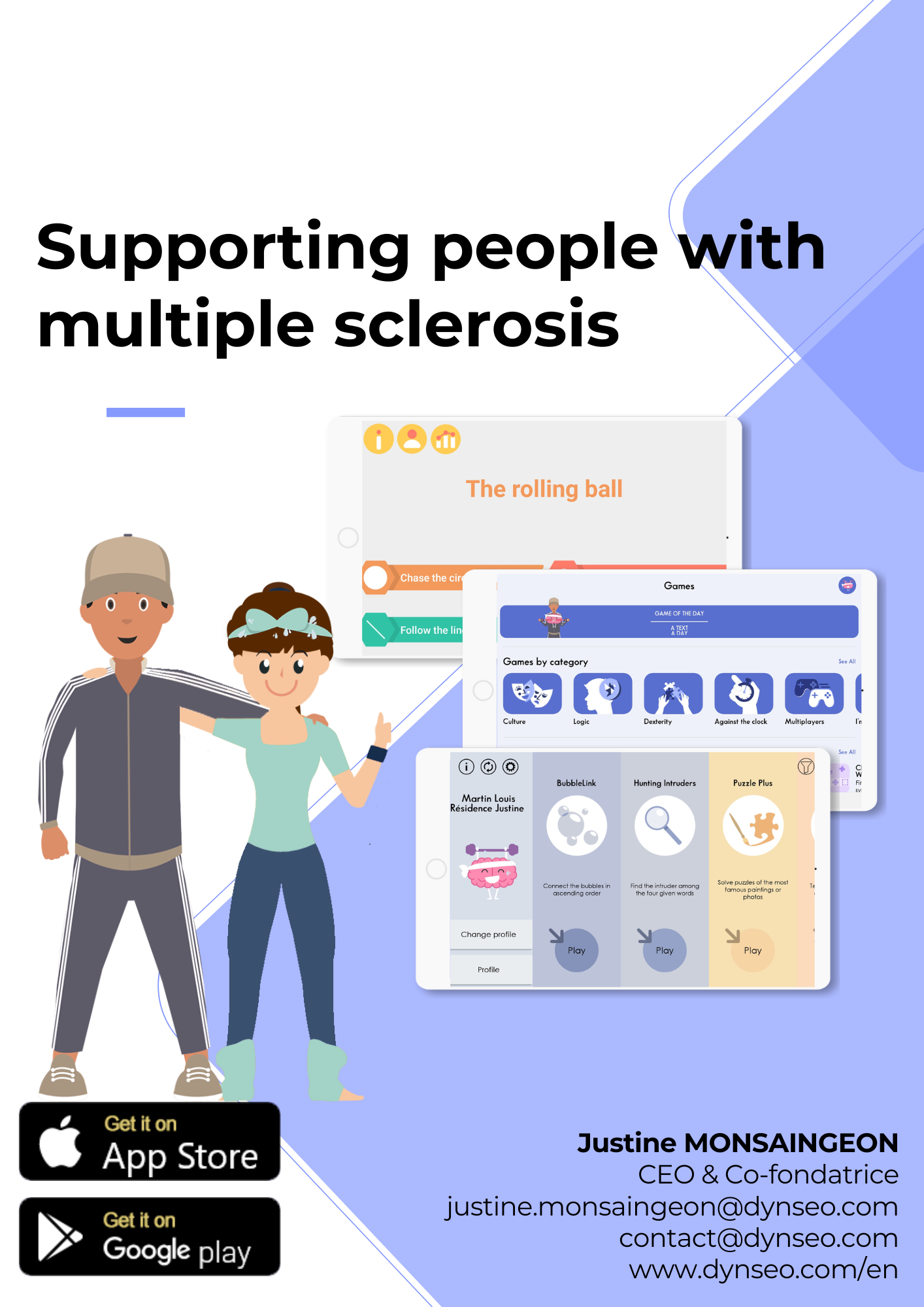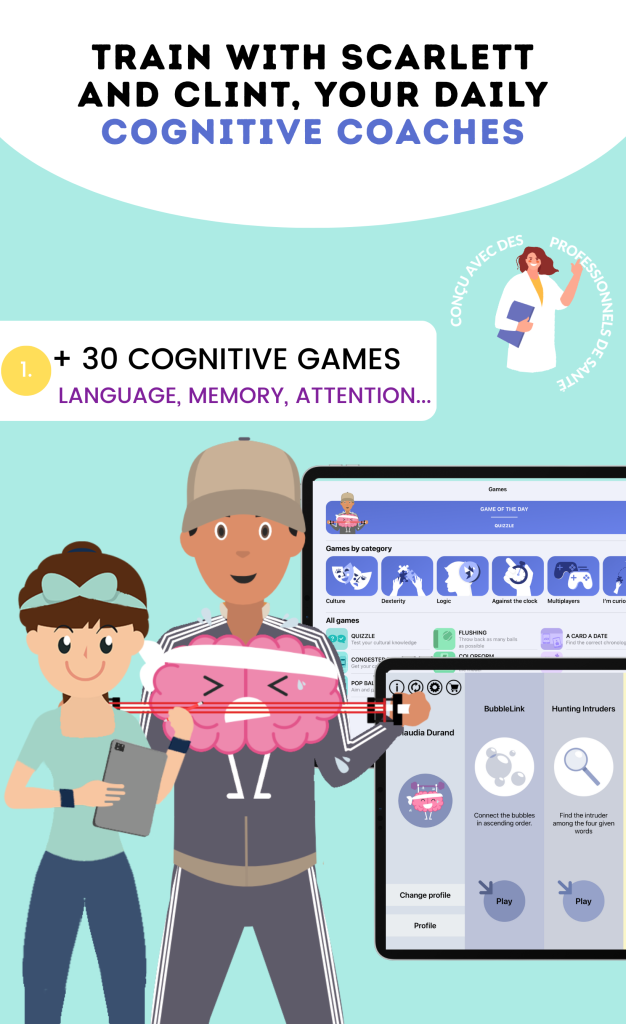When discussing multiple sclerosis (MS), we often first think of physical symptoms: fatigue, walking difficulties, balance problems. However, another facet of the disease, more discreet but equally impactful, affects a majority of patients: cognitive disorders. Your brain, this remarkable machine for processing information, can become sluggish, as if messages struggle to find their way. This is where a healthcare professional, often underestimated in this field, plays a key role: the speech therapist.
Far from being limited to speech or swallowing disorders, the speech therapist is a true coach for your brain. He or she helps you understand, navigate around, and rehabilitate the cognitive functions that pose daily challenges. This article aims to demystify their intervention and show you how this partnership can help you live better with multiple sclerosis.
Before discussing solutions, it is essential to clearly identify the problem. Cognitive disorders in MS are not a form of dementia. They are a direct consequence of the lesions that the disease creates on the communication pathways of your central nervous system. Imagine your brain as a vast road network. MS creates slowdowns, detours, or even blockages on certain roads. Information then takes longer to arrive or gets lost along the way.
What are the cognitive domains most often affected?
These difficulties do not manifest in the same way for everyone, but certain areas are more frequently affected. The speech therapist is trained to precisely identify which ones concern you. Here are the most common:
- The speed of information processing: This is often the first and most widespread symptom. You feel like your brain is functioning in slow motion. Following a fast conversation, reacting quickly in an unexpected situation, or understanding a joke on the fly can become a real challenge.
- Working memory and learning: This does not involve forgetting old memories, but rather having difficulty retaining new information for a short period. For example, memorizing a phone number long enough to write it down, or remembering the beginning of a long sentence you just read.
- Attention and concentration: Focusing on a single task, especially in a noisy environment, can be exhausting. You may struggle to read a book without your mind wandering, or to stay focused during a professional meeting.
- Executive functions: This somewhat technical term encompasses high-level skills essential for daily life. It involves your ability to plan, organize, solve problems, make decisions, and manage multiple tasks at once (the famous multitasking).
The concrete impact on your daily life
These cognitive difficulties, although invisible, can have significant repercussions on your personal, social, and professional life. You might recognize yourself in some of these situations: losing the thread of your thoughts mid-sentence, forgetting appointments despite your efforts, feeling overwhelmed by preparing a meal that requires managing multiple cooking processes simultaneously, or struggling to follow the plot of a movie.
This "cognitive fatigue" is exhausting and can generate frustration, a sense of incompetence, and gradual isolation. Recognizing these difficulties is the first step to taking action. The second is to consult the right person: the speech therapist.
The speech therapy assessment: mapping your strengths and weaknesses
The first meeting with a speech therapist will not start with exercises, but with a thorough evaluation. This step, called cognitive assessment, is fundamental. Its goal is to create an accurate map of your cognitive functioning, much like a GPS identifying smooth roads, construction zones, and alternative routes in your brain.
How does this evaluation proceed?
The assessment generally consists of two main parts. First, a detailed interview, called anamnesis. The speech therapist will ask you questions about your daily life, the difficulties you encounter, their frequency, their impact on your morale, and your quality of life. This is a crucial exchange moment where your feelings are at the heart of the process.
Next comes the phase of standardized tests. This is not a school exam, but a series of fun and varied exercises (puzzles, memorizing lists of words, planning tasks, etc.) that objectively evaluate each cognitive function (memory, attention, executive functions...). These tests compare your performance to that of people of the same age and educational level, in order to identify what constitutes a specific difficulty related to MS.
Defining meaningful goals for you
At the end of this assessment, the speech therapist will not simply provide you with a list of "scores". He or she will share with you a comprehensive analysis of your strengths and weaknesses. Most importantly, this evaluation will allow for the establishment of concrete, personalized, and realistic care objectives.
The goal is not to "cure" cognitive disorders, but to learn to live with them, to reduce them when possible, and to navigate around them intelligently. One goal could be: "I want to be able to read an entire chapter of a book without losing the thread" or "I would like to participate in a family meal without feeling exhausted by overlapping conversations".
The two pillars of care: rehabilitation and compensation

Once the map of your functioning is established and the destination set (your goals), the work with the speech therapist can begin. It revolves around two complementary axes, like the two oars of a boat that allow you to move forward: rehabilitation and compensation.
Rehabilitation: training your brain to create new pathways
Rehabilitation aims to directly stimulate the weakened cognitive functions. The brain has an extraordinary capacity called neuroplasticity: it can reorganize and create new connections to compensate for damaged areas. The speech therapist acts as a sports coach who offers you targeted exercises to strengthen these new neural pathways.
These exercises are progressive and adapted to your abilities. They may involve memory games, selective attention exercises, or problem-solving tasks. The goal is to challenge the brain intensively and repeatedly to encourage it to reconfigure.
It is in this perspective that digital tools have been developed to complement the work done in sessions. Our applications, particularly our adapted brain training programs Edith & Joe, are designed precisely for this purpose. They offer a wide variety of fun exercises that specifically target different cognitive functions. Used in collaboration with your speech therapist, they allow for continued training at home in an autonomous and motivating way. Your therapist can track your progress, adjust the difficulty of the exercises, and use the data to prepare your sessions in the office, thus creating continuous and personalized follow-up.
Compensation: learning strategies to navigate around obstacles
If rehabilitation is akin to repairing a road, compensation involves learning to use effective detours. When a cognitive function remains persistently deficient, it is pointless to persist. It is smarter and less tiring to learn to do things differently. The speech therapist is there to help you develop your own "toolbox" of strategies.
These strategies are extremely concrete and aim to simplify your daily life. Here are some examples of what you could implement with your therapist's help:
- For memory and planning: Systematically use a planner (paper or digital), create task lists for complex activities (shopping, preparing a trip), use alarms and reminders on your phone, or establish a morning and evening routine to not forget anything important.
- For attention: Learn to work in a calm environment without distractions, take regular breaks to allow your brain to rest (the Pomodoro technique, for example), or practice focusing on one thing at a time while avoiding multitasking.
- For communication: Do not hesitate to ask your interlocutor to repeat, to speak more slowly, or to rephrase their words in your own words to verify that you have understood correctly. Choosing calm moments for important conversations is also an effective strategy.
The speech therapist helps you choose the strategies best suited to your personality and lifestyle, and supports you in making them true reflexes.
The speech therapist, an ally for you and your loved ones
The role of the speech therapist does not stop at the doors of their office. He or she is a valuable partner who can also intervene with your family to facilitate understanding and communication.
Educating for better understanding
Cognitive disorders are invisible, making them difficult for loved ones to understand. A forgetfulness can be interpreted as a lack of interest, a difficulty in following a conversation as voluntary distraction. The speech therapist can explain to your family and friends the nature of your difficulties. This psychoeducation is essential: it helps to alleviate everyone's guilt and replace unspoken issues and misunderstandings with empathy and support. Knowing that your slowness is not laziness but a symptom of the disease changes everything in a relationship.
Adapting the environment and communication
The speech therapist can also provide very practical advice to your loved ones to make your life easier. For example, they can suggest speaking to you in a quiet place, looking at you when they address you, avoiding asking you multiple questions at once, or giving you time to find your words without finishing your sentences for you. These small adjustments can significantly reduce your cognitive load and make social interactions much more pleasant and less tiring.
New technologies, partners in your rehabilitation
Today, speech therapy is enriched by new technologies. They do not replace the therapist but offer powerful tools to complement and enhance the work done in sessions.
Fun programs to stay motivated
One of the challenges of rehabilitation is maintaining motivation over the long term. Exercises can sometimes seem repetitive. The advantage of applications and software is their playful aspect ("gamification"). Transforming a memory exercise into a game with points, levels, and rewards can make training much more engaging.
Moreover, these tools offer great flexibility. You can train for a few minutes a day, wherever you are, from a tablet or smartphone. This regularity is one of the keys to the success of rehabilitation.
Edith & Joe: our solutions for tailored training
It is with this conviction that we developed our programs Edith & Joe. These are not just brain games. They are therapeutic tools designed in collaboration with healthcare professionals to specifically meet the needs of people with neurological diseases like multiple sclerosis.
- An adaptable and evolving program: The difficulty of the exercises automatically adjusts to your performance. If you succeed, the level increases. If you struggle, the game simplifies. This keeps you in a stimulating yet never discouraging challenge zone.
- A collaboration with your therapist: Edith & Joe are designed to be used in tandem: by you, the patient, at home, and by your speech therapist in the office. The latter has access to a dashboard that shows your results, your progress, but also the areas where you struggle the most. This way, he can analyze your performance remotely and prepare the next session based on objective data. This is a considerable time and efficiency gain.
- A support for your autonomy: By allowing you to train regularly between sessions, these programs make you an active participant in your care. You no longer just endure your difficulties; you actively work to overcome them, which is extremely rewarding and beneficial for morale.
In conclusion, while multiple sclerosis can sometimes give the impression of sowing disorder in your mind, the speech therapist is there to help you restore order. He or she does not possess a magic wand, but expertise, tools, and listening that can make a real difference in your quality of life. By precisely identifying your difficulties, teaching you bypass strategies, and stimulating your brain through targeted exercises, potentially supported by innovative digital tools like Edith & Joe, they give you the keys to regain control of your daily life. Do not hesitate to discuss your cognitive disorders with your neurologist; he or she can guide you to this valuable ally in your care journey.
Here is our guide to support people suffering from Multiple Sclerosis: https://www.dynseo.com/en/la-reeducation-cognitive-lorsque-lon-est-atteint-dune-sclerose-en-plaques/




